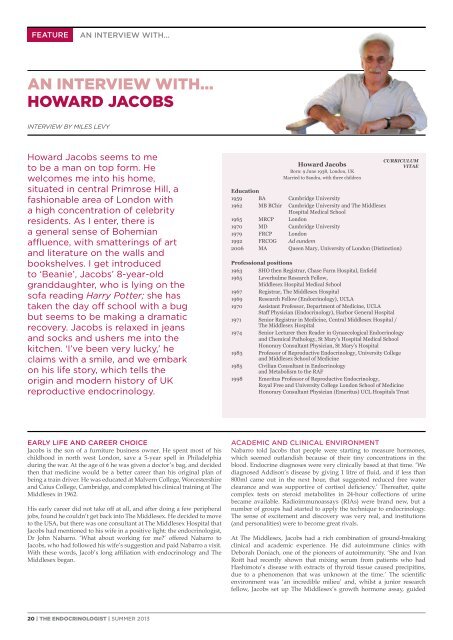Howard Jacobs
Howard Jacobs
Howard Jacobs
Create successful ePaper yourself
Turn your PDF publications into a flip-book with our unique Google optimized e-Paper software.
FEAtURE<br />
AN INTERVIEW WITH...<br />
HOWARD jACOBS<br />
INTERvIEW BY MILES LEvY<br />
AN INtERVIEW WItH...<br />
<strong>Howard</strong> <strong>Jacobs</strong> seems to me<br />
to be a man on top form. He<br />
welcomes me into his home,<br />
situated in central Primrose Hill, a<br />
fashionable area of London with<br />
a high concentration of celebrity<br />
residents. As I enter, there is<br />
a general sense of Bohemian<br />
affluence, with smatterings of art<br />
and literature on the walls and<br />
bookshelves. I get introduced<br />
to ‘Beanie’, <strong>Jacobs</strong>’ 8-year-old<br />
granddaughter, who is lying on the<br />
sofa reading Harry Potter; she has<br />
taken the day off school with a bug<br />
but seems to be making a dramatic<br />
recovery. <strong>Jacobs</strong> is relaxed in jeans<br />
and socks and ushers me into the<br />
kitchen. ‘I’ve been very lucky,’ he<br />
claims with a smile, and we embark<br />
on his life story, which tells the<br />
origin and modern history of UK<br />
reproductive endocrinology.<br />
EARLY LIFE AND CAREER CHOICE<br />
<strong>Jacobs</strong> is the son of a furniture business owner. He spent most of his<br />
childhood in north west London, save a 5-year spell in Philadelphia<br />
during the war. At the age of 6 he was given a doctor’s bag, and decided<br />
then that medicine would be a better career than his original plan of<br />
being a train driver. He was educated at Malvern College, Worcestershire<br />
and Caius College, Cambridge, and completed his clinical training at The<br />
Middlesex in 1962.<br />
His early career did not take off at all, and after doing a few peripheral<br />
jobs, found he couldn’t get back into The Middlesex. He decided to move<br />
to the USA, but there was one consultant at The Middlesex Hospital that<br />
<strong>Jacobs</strong> had mentioned to his wife in a positive light: the endocrinologist,<br />
Dr John Nabarro. ‘What about working for me?’ offered Nabarro to<br />
<strong>Jacobs</strong>, who had followed his wife’s suggestion and paid Nabarro a visit.<br />
With these words, Jacob’s long affiliation with endocrinology and The<br />
Middlesex began.<br />
20 | THE ENDOCRINOLOGIST | SUMMER 2013<br />
<strong>Howard</strong> <strong>Jacobs</strong><br />
Born: 9 June 1938, London, UK<br />
Married to Sandra, with three children<br />
CURRICULUM<br />
VITAE<br />
Education<br />
1959 BA Cambridge University<br />
1962 MB BChir Cambridge University and The Middlesex<br />
Hospital Medical School<br />
1965 MRCP London<br />
1970 MD Cambridge University<br />
1979 FRCP London<br />
1992 FRCOG Ad eundem<br />
2006 MA Queen Mary, University of London (Distinction)<br />
Professional positions<br />
1963 SHO then Registrar, Chase Farm Hospital, Enfield<br />
1965 Leverhulme Research Fellow,<br />
Middlesex Hospital Medical School<br />
1967 Registrar, The Middlesex Hospital<br />
1969 Research Fellow (Endocrinology), UCLA<br />
1970 Assistant Professor, Department of Medicine, UCLA<br />
Staff Physician (Endocrinology), Harbor General Hospital<br />
1971 Senior Registrar in Medicine, Central Middlesex Hospital /<br />
The Middlesex Hospital<br />
1974 Senior Lecturer then Reader in Gynaecological Endocrinology<br />
and Chemical Pathology, St Mary’s Hospital Medical School<br />
Honorary Consultant Physician, St Mary’s Hospital<br />
1983 Professor of Reproductive Endocrinology, University College<br />
and Middlesex School of Medicine<br />
1985 Civilian Consultant in Endocrinology<br />
and Metabolism to the RAF<br />
1998 Emeritus Professor of Reproductive Endocrinology,<br />
Royal Free and University College London School of Medicine<br />
Honorary Consultant Physician (Emeritus) UCL Hospitals Trust<br />
ACADEMIC AND CLINICAL ENVIRONMENT<br />
Nabarro told <strong>Jacobs</strong> that people were starting to measure hormones,<br />
which seemed outlandish because of their tiny concentrations in the<br />
blood. Endocrine diagnoses were very clinically based at that time. ‘We<br />
diagnosed Addison’s disease by giving 1 litre of fluid, and if less than<br />
800ml came out in the next hour, that suggested reduced free water<br />
clearance and was supportive of cortisol deficiency.’ Thereafter, quite<br />
complex tests on steroid metabolites in 24-hour collections of urine<br />
became available. Radioimmunoassays (RIAs) were brand new, but a<br />
number of groups had started to apply the technique to endocrinology.<br />
The sense of excitement and discovery was very real, and institutions<br />
(and personalities) were to become great rivals.<br />
At The Middlesex, <strong>Jacobs</strong> had a rich combination of ground-breaking<br />
clinical and academic experience. He did autoimmune clinics with<br />
Deborah Doniach, one of the pioneers of autoimmunity. ‘She and Ivan<br />
Roitt had recently shown that mixing serum from patients who had<br />
Hashimoto’s disease with extracts of thyroid tissue caused precipitins,<br />
due to a phenomenon that was unknown at the time.’ The scientific<br />
environment was ‘an incredible milieu’ and, whilst a junior research<br />
fellow, <strong>Jacobs</strong> set up The Middlesex’s growth hormone assay, guided


